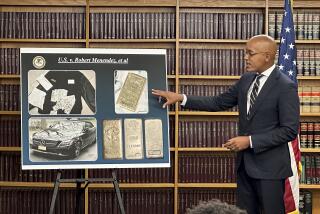Iran-Contra Israeli Funds Kept Secret, Magazine Says : Investigation: Senators also agreed before the highly publicized hearings not to ‘go after’ Ronald Reagan, the article says.
- Share via
WASHINGTON — Congressional Iran-Contra investigators discovered but kept secret a diversion to Israeli intelligence of more than $1 million in proceeds from the Ronald Reagan Administration’s sale of arms to Iran, the New York Times Magazine reports.
Today’s issue of the magazine also reports, in an article by investigative journalist Seymour Hersh, that senators decided before the much-publicized Iran-Contra hearings that they would not “go after” President Reagan. They agreed they would avoid seeking impeachment unless it seemed Reagan had been fully aware of the diversion of arms sale money to the Nicaraguan Contras, the article said.
The decisions were governed by a desire to avoid jeopardizing the release of U.S. hostages held in Lebanon and to protect the emerging strategic arms negotiations with the Soviet Union, as well as by Reagan’s age and immense public popularity, Hersh writes.
According to the article, Senate and House committees learned that former Gen. Richard V. Secord and his partner, Albert A. Hakim, who worked for White House aide Oliver L. North in the affair, had diverted Iranian arms sale profits to the Israelis for the covert actions.
The committees obtained documents that showed four cash transfers between Hakim’s Swiss bank account and an account controlled by Amiram Nir, an Israeli counterterrorism adviser, Hersh writes.
This transfer was not mentioned in the panels’ joint report in November, 1987. The report devotes three paragraphs to the subject and describes the efforts by code-names “TH-1, TH-2 and so on.” It says North testified that the efforts “had not progressed beyond the planning stage” and that he therefore did not seek presidential authorization.
But Hersh says “highly placed American intelligence officials,” whom he did not identify by name, told him that several of the North-Nir operations did take place in 1985 and 1986.
These included covert electronic monitoring of the highway between Damascus and Beirut, a series of attempts to penetrate the Shiite Amal militia and the Druse sect inside Lebanon and a continuing effort to locate Arab terrorists suspected of blowing up the Marine barracks in Lebanon in 1983, Hersh reports.
He adds that Secord acknowledged in an interview he was aware of the payments to Nir and said of them, “This is black money--Israeli black money,” a term used to describe the financing of covert operations.
Senate committee chief counsel Arthur L. Liman is quoted by Hersh as saying there were limits on what he could publish from the investigation. Other sources told Hersh that both House and Senate chairmen told Liman not to make anything public that might disrupt continuing efforts to gain the release of U.S. hostages held in Lebanon.
Liman told Hersh that the question of whether the diversion to the Israelis was legal without written presidential authority--a finding--was referred to the Senate and House intelligence committees. Neither has made any public report on the matter.
The desire to protect Reagan and the strategic arms negotiations motivated senators, Hersh says.
According to one participant, Hersh writes: “At an early caucus in January (1987) . . . the senators reached one easy consensus. ‘We don’t want to go after the President,’ the participant said. ‘He was too old.’ ”
The witness also told Hersh that senators believed Reagan could not understand what had happened.
More to Read
Sign up for Essential California
The most important California stories and recommendations in your inbox every morning.
You may occasionally receive promotional content from the Los Angeles Times.













